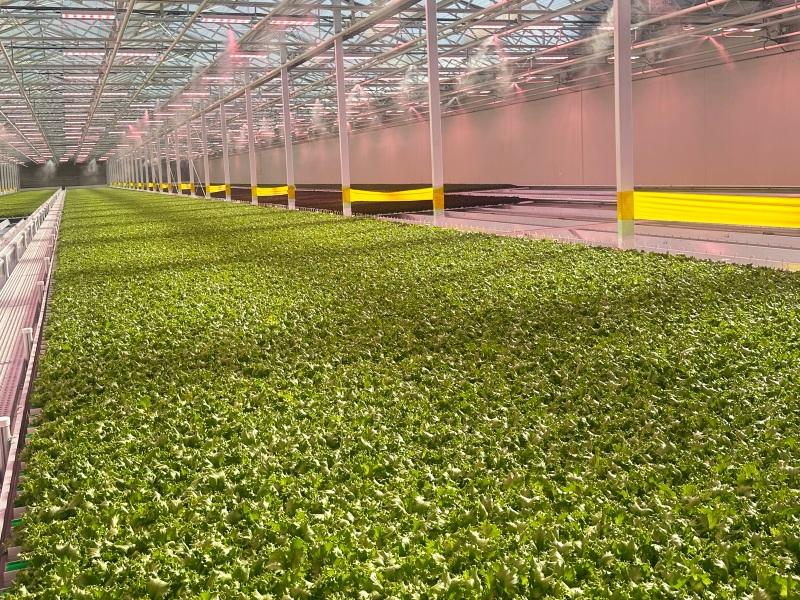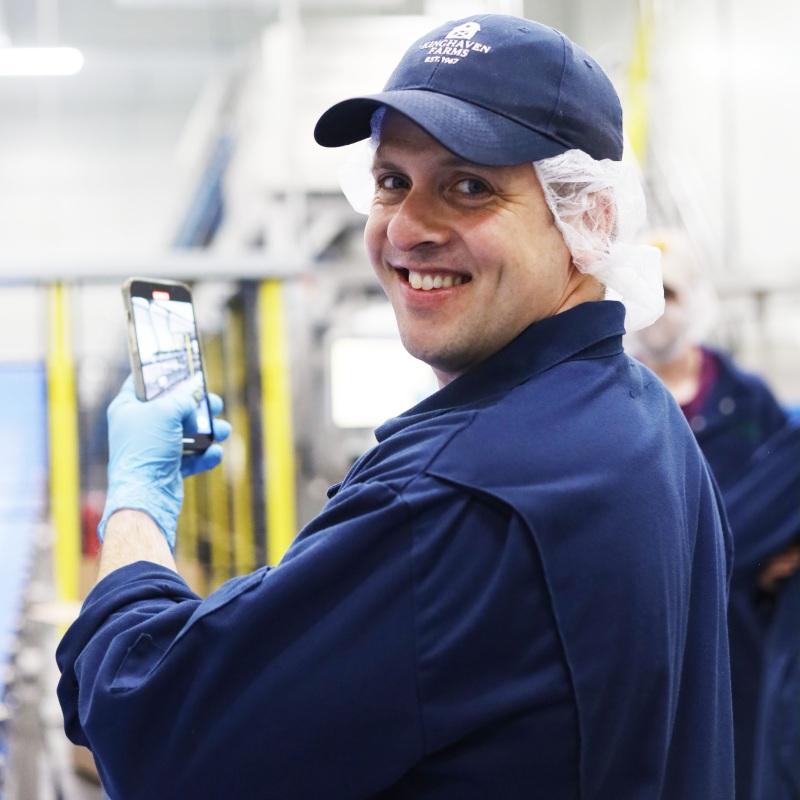
A family farm north of Toronto renowned for its thoroughbred horse breeding has a new claim to fame as a fully automated leafy greens greenhouse, driven to make the most sustainable salad possible.
Sited on a five-acre block of Kinghaven Farms, lettuce varieties and spring mix vegetables are cultivated in the greenhouse. The greens are sold under the Haven Greens brand and found on the shelves of major grocery stores in Ontario.
All the seeding, sowing and harvesting is automated, enabling constant operations. A bounty of data is collected to direct climate control, the ideal moment for irrigation, and extracting maximum value from its resources.
The greenhouse can produce just under 10,000 pounds of leafy greens per day. At full output, Haven Greens expects it can cross the 10,000-pound threshold to just under four million pounds per year.
Sustainability is at the forefront of Kinghaven Farms, located in King City. Over 90 per cent of the water and fertilizer is reused, a solar array partially powers operations with clean electricity, no pesticides are employed, and less transportation is needed to deliver leafy greens to Canadian consumers.
“We want to lead the way in this new category of fully automated, clean and sustainable, greenhouse-grown leafy greens here in Canada,” Jay Willmot, the founder and CEO of Haven Greens, said in an interview with Sustainable Biz Canada.
The goal of greener leafy greens
Willmot has had one foot in agriculture and the other in sustainability for years. While he managed the farm that has been in the Willmots’ hands since 1967, he served as a lawyer for renewable energy infrastructure companies.
In 2008, he reflected on the challenges of sustainably running the horse farm, thinking about how to redefine the family business for future generations. Willmot recalled the sage advice of a professor who taught him to create a list of what angers him the most, and form business ideas born out of the frustrations.
The “old, slimy, smelly, yucky greens” he would pick out of a container came to mind. He learned this unpleasant surprise is often a consequence of over 90 per cent of Canada’s leafy greens being imported from the Southwestern U.S., decaying along a trip that covers thousands of kilometres.
“We wanted to build infrastructure that could attempt to reduce that reliance,” Willmot said, “and also bring more sustainability into our food system by reducing food kilometres, utilizing more renewable energy, trying to introduce circularity and recycling and upcycling into everything that we did.”
He spent 2021 setting up Haven Greens and planned the greenhouse in 2022. Willmot used 2023 to finance the project, and had the greenhouse built over the course of 2024.
Today, it is one of the most advanced and greenest indoor farms in Canada.
Automation, AI, sustainability at Kinghaven

Efficiency and sustainability go hand in hand at Kinghaven. Advanced climate, irrigation and fertigation systems are in place to aid the cultivation team, analyzing data on the greenhouse operations to determine the ideal timings for watering the crops and being most efficient with energy.
Artificial intelligence is integrated throughout the farm, controlling the climate management and the automated seeding, sowing and harvesting. Thus, Kinghaven can be “hyperproductive” and cut costs, Willmot said.
The hydroponics system ensures water and fertilizer in the greenhouse are recirculated to a high degree, and Kinghaven primarily relies on rain water for its water supply. The farm has slashed the water used to produce a kilogram of leafy greens by 96 per cent compared to the average field-grown batch, Willmot added.
It has cut fertilizer use by a similar degree.
The leafy greens are grown in peat moss, and Kinghaven participates in a local program where it sends its used growing medium, root stalks and peat moss to be composed into top soil for local farms.
“We’re using our facility not just to grow food here, but also to build new agricultural, arable land here in York Region to create more farms, to produce more local food,” Willmot said, which further reduces transportation emissions.
A small solar panel installation currently provides some of the energy for the greenhouse. To contribute toward Willmot’s ambition of Kinghaven being net-zero by 2027, a three-megawatt solar array is being built next to the facility, with a target of operating that year.
A second greenhouse planned
In Ontario, Haven Greens products are sold in Metro, Sobeys and Giant Tiger stores, plus independent retailers. Food service businesses in Quebec, Alberta and the U.S. are also customers.
Since the greenhouse was commissioned in February, the trade relationship between Canada and the U.S. has taken a turn for the worse because of a trade war. A buy Canadian sentiment has been to the benefit of the company, Willmot said, supporting sales.
But he noted the seed for Haven Greens was planted before trade was shaken up. Canadians should want a domestic supply of leafy greens to guard against the price shocks of U.S. imports and to reduce carbon emissions from transporting food, Willmot added.
Growth has been brisk enough to fuel expansion. Work is underway for Phase 2 of Kinghaven, which will be another five-acre greenhouse. Willmot plans to use the experience from the first greenhouse and deploy the latest technologies to potentially double productivity. He hopes to have it commissioned in 2027.










